As promised, the sequel to our epic list of staff reading recommendations is here! These picks go great with long sunny day on the patio – hammock recommended, but not required – and a nice, cool beverage.
Mireille’s Pick
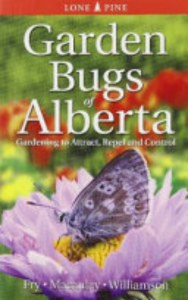
Garden Bugs of Alberta by Ken Fry, Doug Macaulay, Don Williamson – Curbside pickup
“My pick is Garden Bugs of Alberta. Not something you would read cover to cover, but useful and instructive. Great photos/drawings and handy charts! Wolf spiders, spittle bugs, raspberry crown borers? What?! ” – Mireille
Peter’s Picks

The Worlds of Sholem Aleichem by Jeremy Dauber – Curbside pickup
Novelist, playwright, journalist, essayist, and editor Sholem Aleichem, was one of the founding giants of modern Yiddish literature. The creator of a pantheon of characters who have been immortalized in books and plays, he provided readers throughout the world with a fascinating window into the world of Eastern European Jews as they began to confront the forces of cultural, political and religious modernity that tore through the Russian Empire in the final decades of the nineteenth century.
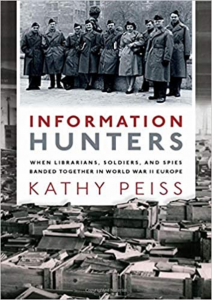
Information Hunters : When Librarians, Soldiers and Spies Banded Together in World War II Europe by Kathy Peiss – ebook
Information Hunters examines the unprecedented American effort to acquire foreign publications and information in World War II Europe. An unlikely band of librarians, scholars, soldiers and spies went to Europe to collect books and documents to aid the Allies’ cause. They travelled to neutral cities to find enemy publications for intelligence analysis and followed advancing armies to capture records in a massive program of confiscation. After the war, they seized Nazi works from bookstores and schools, and gathered countless looted Jewish books. Improvising library techniques in wartime conditions, they contributed to Allied intelligence, preserved endangered books, engaged in restitution and participated in the denazification of book collections. This work explores what collecting meant to the men and women who embarked on these missions, and how the challenges of a total war led to an intense focus on books & documents.
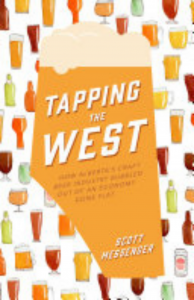
Tapping the West : How Alberta’s Craft Beer Industry Bubbled Out of an Economy Gone Flat by Scott Messenger – ebook
“That’s Leah Vanderjagt’s husband and I’m sure I’m not the only one here enjoying reading about beer these days.”
When Alberta eliminated its laws around mandatory minimum brewing capacity in 2013, the industry suddenly opened to the possibility of small-batch craft breweries. From roughly a dozen in operation before deregulation, there are now more than a hundred today. Messenger takes readers on the road with him to investigate artifacts left behind by Alberta brewers dating to the late-1800s, farms responsible for the province’s unrivalled malt and into the brewhouses and backstories of some of Canada’s best new beer makers. It’s an insider’s look at history in the making.
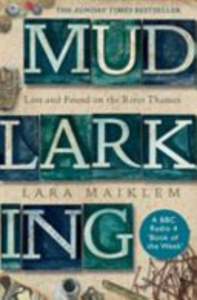
Mudlarking : Lost and Found on the River Thames by Lara Maiklem – For your Refworks
Mudlarking is the story of the River Thames and its people, told through the objects that Lara has eased from its muddy clutches over the years. Weaving her story through and around the history of the river, from prehistory to the present day, she uses her finds to bring the ordinary lives of long forgotten Londoners to life.
Kara’s Pick

Soucouyant by David Chariandy – eBook available through HathiTrust
A “soucouyant” is an evil spirit in Caribbean lore, a reminder of past transgressions that refuse to diminish with age. In this beautifully told novel that crosses borders, cultures and generations, a young man returns home to care for his aging mother, who suffers from dementia. In his efforts to help her, and in turn make amends for their past estrangement from one another, he is compelled to re-imagine his mother’s stories for her before they slip completely into darkness. In delicate, heartbreaking tones, the names for everyday things fade while at the same time a beautiful, haunted life, stained by grief, is slowly revealed.
Elisabet’s Picks
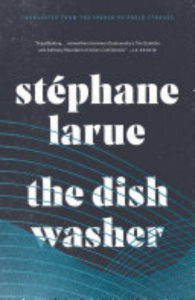
The Dishwasher by Stephane Larue (Canadian author) – ebook
“I have this book on my must read list and I am happy to see that we have both the original French version as well as an English language translation!” – Elisabet
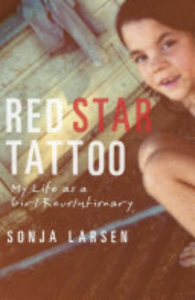
Red Star Tatoo : My Life as a Girl Revolutionary by Sonja Larsen (Canadian author) – Curbside pickup
Picked by Elisabet’s sister, Margrét!
From hardscrabble Milwaukee to dreamy Hawaii; from turbulent Montreal to free-spirited California, Red Star Tattoo is Sonja Larsen’s unforgettable memoir of a young life spent on the move. A small, skinny 8-year-old girl holding a teddy bear stands by the side of a country road with a young man she barely knows. They’re hitchhiking from a commune in Quebec to one in California. It is 1973 and somehow the girl’s parents think this is a good idea. Sonja Larsen’s is a childhood in which family members come and go and where radical politics take over her mother’s life, and her own. Red Star Tattoo explores the seductions and dangers of extremism.

Monoceros by Suzette Mayr (Alberta author) – ebook
Picked by Elisabet’s sister, Margrét!
“Monoceros is a masterpiece of the tragicomic. By exploring the effects of a suicide on characters outside the immediate circle, Mayr offers a dazzlingly original look at the ripple effects – both poignant and funny – of a tragedy. A tender, bold work!”
Sarah-Jeanne’s Picks
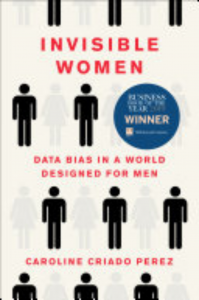
Invisible Women : Data Bias in a World Designed For Men by Caroline Criado Perez – ebook
Data is fundamental to the modern world. From economic development, to healthcare, to education and public policy, we rely on numbers to allocate resources and make crucial decisions. But, because so much data fails to take into account gender, and because it treats men as the default and women as atypical, bias and discrimination are baked into our systems. And, women pay tremendous costs for this bias, in time, money, and often with their lives. Celebrated feminist advocate Caroline Criado Perez investigates the shocking root cause of gender inequality and research in Invisible Women — diving into women’s lives at home, the workplace, the public square, the doctor’s office and more. Built on hundreds of studies in the US, the UK and around the world, and written with energy, wit, and sparkling intelligence, this is a groundbreaking, unforgettable exposé that will change the way you look at the world.
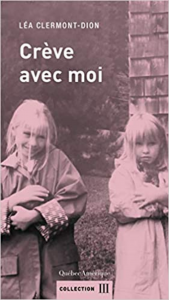
Crève avec moi : Best Friends Forever by Léa Clermont-Dion – Curbside pickup
“L’air d’un fantôme abandonné. Poupie, sur le trottoir. Un fantôme. L’air froid. J’ai mal à la gorge qui pique. Va-t-elle crever? Le vide. Christophe a crissé son camp après avoir touché les boules d’Emma-Jade comme un cave. Saoul. Il a capoté quand il a vu Poupie par terre. Va donc crever dans le fossé. Dans ma tête et mon cœur, je suis prise de vertige. Je fonds. Je panique. Je meurs par en dedans.”
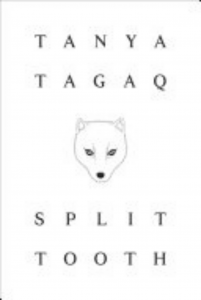
Split Tooth by Tanya Tagaq – For your Refworks
A girl grows up in Nunavut in the 1970s. She knows joy, friendship and parents’ love. She knows boredom, listlessness and bullying. She knows the tedium of the everyday world, and the raw, amoral power of the ice and sky; the seductive energy of the animal world. She knows the ravages of alcohol, and violence at the hands of those she should be able to trust. She sees the spirits that surround her, and the immense power that dwarfs all of us. When she becomes pregnant, she must navigate all of this.
Jessica’s Picks
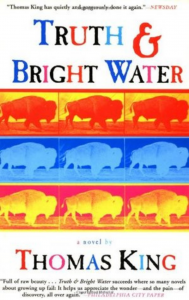
Truth & Bright Water by Thomas King – Curbside Pickup
Truth and Bright Water tells of a summer in the life of Tecumseh and Lum, young Native-American cousins coming of age in the Montana town of Truth and the Bright Water Reserve across the river in Alberta. It opens with a mysterious woman with a suitcase, throwing things into the river — then jumping in herself. Tecumseh and Lum go to help, but she and her truck have disappeared. Other mysteries puzzle Tecumseh: whether his mom will take his dad back; if his rolling-stone aunt is home to stay; why no one protects Lum from his father’s rages. Then Tecumseh gets a job helping an artist — Bright Water’s most famous son — with the project of a lifetime. As Truth and Bright Water prepare for the Indian Days Festival, their secrets come together in a climax of tragedy, reconciliation and love.

A Walk in the Woods by Bill Bryson – Curbside pickup
God only knows what possessed Bill Bryson, a reluctant adventurer if ever there was one, to undertake a gruelling hike along the world’s longest continuous footpath — The Appalachian Trail.
The 2,000-plus-mile trail winds through 14 states, stretching along the east coast of the United States, from Georgia to Maine. It snakes through some of the wildest and most spectacular landscapes in North America, as well as through some of its most poverty-stricken and primitive backwoods areas.
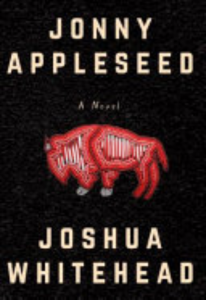
Jonny Appleseed by Joshua Whitehead – ebook, for your Refworks
Off the reserve and trying to find ways to live and love in the big city, Jonny Appleseed, a young Two-Spirit/Indigiqueer, becomes a cybersex worker who fetishizes himself in order to make a living. Jonny’s world is a series of breakages, appendages and linkages. And, as he goes through the motions of preparing to return home for his step-father’s funeral, he learns how to put together the pieces of his life. Jonny Appleseed is a unique, shattering vision of Indigenous life, full of grit, glitter and dreams.
Grace’s Picks
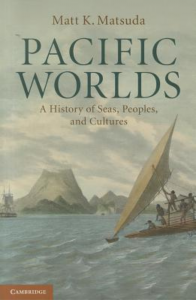
Pacific Worlds : A History of Seas, Peoples, and Cultures by Matt K. Matsuda – ebook
This essential single-volume history of the Pacific traces the global interactions and remarkable peoples that have connected these regions with each other and with Europe and the Indian Ocean, for millennia. From ancient canoe navigators, monumental civilizations, pirates and seaborne empires, to the rise of nuclear testing and global warming, Matt Matsuda ranges across the frontiers of colonial history, anthropology, Pacific Rim economics and politics, piecing together a history of the region.
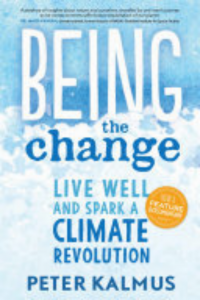
Being the change : Live Well and Spark a Climate Revolution by Peter Kalmus – ebook
How a climate scientist and suburban father cut his climate impact down to one tenth the US average and became happier because of it. Being the Change merges science, spirituality and practical knowledge to offer a deeply optimistic message: living without fossil fuels is not only possible, it can be better.
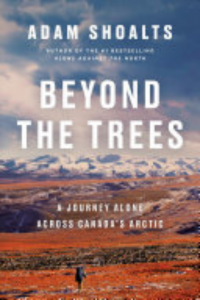
Beyond the Trees : A Journey Alone Across Canada’s Arctic by Adam Shoalts – For your Refworks
Beyond the Trees recounts Adam Shoalts’s epic, solo crossing of Canada’s mainland Arctic in a single season — the first in recorded history. It’s also a multilayered story that weaves the narrative of Shoalts’s journey into accounts of other adventurers, explorers, First Nations, fur traders, dreamers, eccentrics and bush pilots to create an unforgettable tale of adventure and exploration. Interspersed with his stories of navigating mazes, of shifting ice floes, facing down snarling bears and galloping musk-ox, and portaging along knife-edge cliffs above furious rapids, are the fascinating legends, historic persons and incredible anecdotes that make up the lore of the North.
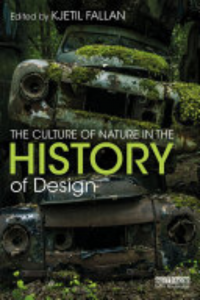
The Culture of Nature in the History of Design by Kjetil Fallan – ebook
The Culture of Nature in the History of Design confronts the dilemma caused by design’s pertinent yet precarious position in environmental discourse through interdisciplinary conversations about the design of nature and the nature of design. Demonstrating that the deep entanglements of design and nature have a deeper and broader history than contemporary discourse on sustainable design and ecological design might imply, this book presents case studies ranging from the eighteenth to the twenty-first century; from Singapore to Mexico.
Sonya’s Picks

Loopy Mango Knitting : 34 Fashionable Pieces You Can Make in a Day by Oejong Kim – ebook
“Because pandemic lock down is a great time to strike up a new hobby, OR if you’re a fan of chunky knits, this book is for you. The projects in this book range from absolute beginner to intermediate skill levels. For a budget friendly substitute of yarns, I recommend any super chunky (weight 6) or jumbo (weight 7) yarn. I wear the “Super Cropped Cardigan” that I knit using this book, in most of my video meetings and always seem to get complimented on it — just saying.” – Sonya

But Did You Die? Setting the Parenting Bar Low by a Bunch of Know It Alls – for your Refworks List
“This will make you laugh and then feel better about your own parenting.” – Sonya
I wish you a Summer full of these good reads! If you need any help accessing an ebook, placing a hold for your curbside pickup or adding these titles to your Refworks list please chat with me or my Information Services Specialist Colleagues on the Library Chat service.
